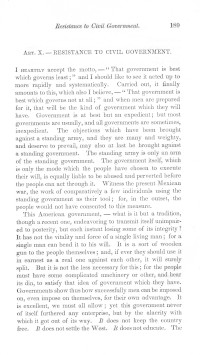Articles
Henry David Thoreau and "Civil Disobedience," Part 1, by
Wendy McElroy,
Freedom Daily, Mar 2005
After some background and biographical material, describes the event (Thoreau's imprisonment) that led to writing "Civil Disobedience" and Thoreau's reaction to those who paid the tax on his behalf, his jailers, his neighbors and Ralph Waldo Emerson
[I]t is "Civil Disobedience" that established [Thoreau's] reputation in the wider political world. It is one of the most influential political tracts ever written by an American. [It] is an analysis of the individual's relationship to the state that focuses on why men obey governmental law even when they believe it to be unjust. But "Civil Disobedience" is not an essay of abstract theory. It is Thoreau's extremely personal response to being imprisoned for breaking the law ... The text of "Civil Disobedience" constitutes the answer he discovered by listening to the "quiet voice within."
Henry David Thoreau and "Civil Disobedience," Part 2, by
Wendy McElroy,
Freedom Daily, Apr 2005
Examines several of the initial themes in Thoreau's "Civil Disobedience", including government injustice, the individual as the source of power and authority, war and the military and the reasons why people obey the state
[Thoreau's "Civil Disobedience" essay] is a secular call for the inviolability of conscience on all issues, and this aspect may account for some of the essay's enduring legacy. The personal quality of "Civil Disobedience" also contributes to its impact, as the essay exudes sincerity more commonly found in diaries and correspondence than in political tracts. The opening sentence ... sets the tone by endorsing Thomas Jefferson's much quoted sentiment on government—"That government is best which governs least." Then Thoreau carries Jefferson's logic one step further ...
Henry David Thoreau and "Civil Disobedience," Part 3, by
Wendy McElroy,
Freedom Daily, May 2005
Further examination of themes in "Civil Disobedience", including unjust laws, politicians and reformers, voting, when to resist the state and the influence on Gandhi
"Civil Disobedience" ... was first rendered as a lecture at the Concord Meeting Hall. In 1849, it was published under the title "Resistance to Civil Government" in the ... Boston Aesthetic Papers ... After Thoreau's death, his sister Sophia prepared his uncollected works for posthumous publication ... The political essays were held until last and ... appeared [in] "A Yankee in Canada with Anti-Slavery and Reform Papers" (1866). It included "Civil Disobedience" ... In 1890, Henry Salt published a collection of Thoreau's political essays, including "Civil Disobedience."
"If 1,000 Men Were Not to Pay Their Tax Bills This Year…", by
Carl Watner,
Reason, Sep 1983
Discusses the 1846 incident that led Thoreau to spend a night in jail for refusing to pay a poll tax and the influence of his friends Bronson Alcott and Charles Lane as well as those Thoreau influenced later
[S]ince Thoreau did not promptly pay up, Staples hauled him off to jail ... Three and a half years before ... Staples had arrested ... Bronson Alcott, on a similar charge. ... Based on his experience in jail and the examples of Alcott and Lane, Thoreau presented a lecture to the Concord lyceum in 1848 titled "The Relation of the Individual to the State." This was the basis of an article published in 1849 that later became known as his essay "Civil Disobedience." Thoreau's main point was that men and women should obey the higher law of their own consciences when it clashed with legislated law.
Thoreau, Henry David (1817-1862), by
Jeff Riggenbach,
The Encyclopedia of Libertarianism, 15 Aug 2008
Biographical essay
Thoreau was the author of perhaps the most radical and influential essay in the history of American political philosophy, "Civil Disobedience." This series of reflections on a night Thoreau spent in the Concord, Massachusetts, jail for tax resistance proclaimed "that government is best which governs not at all" and urged its readers to "withdraw their support, both in person and property" from governments that make and enforce unjust laws. The essay had a profound impact on two of the 20th century's greatest political activists—Mohandas K. Gandhi and Martin Luther King, Jr.

